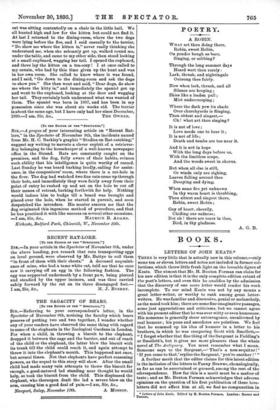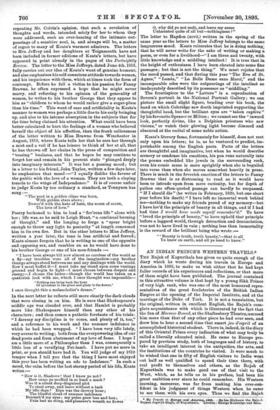BOOKS.
LETTERS OF JOHN KEATS.*
THERE is very little that is actually new in this volume,---only some ten or eleven letters and notes not included in former col-
lections, which throw little fresh light on the loveable figure of Keats. The utmost that Mr. H. Buxton Forman can claim for his new edition is that it is the only complete edition extant of the poet's letters, and even this he qualifies by the admission that the discovery of one more letter would render his work incomplete. To our mind Keats was not by any means a great letter-writer, or worthy to rank among great letter. writers. He was familiar and discursive, genial or melancholy, as the mood took him; there are some fine imaginative passages, some just appreciations and criticisms, but we cannot agree with his present editor that he was ever witty or even humorous. His nonsense is generally sheer extravagance, unenlivened by real humour ; his puns and anecdotes are pointless. We feel that he summed up his idea of humour in a letter to his brothers, in which be was comparing Scott with Smollett,— " I forget whether that fine thing of the Sargeant is Fielding's or Smollett's, but it gives me more pleasure than the whole novel of The Antiquary. You must remember what I mean. Someone says to the Sargeant,—‘ That's a non-sequitur !' If you come to that,' replies the Sargeant, you're another ! ' " A further merit that the editor claims for this latest edition is the inclusion of the letters to Fanny Brawne, chonologically, as far as can be ascertained or guessed, among the rest of the cOrrespondence. How far this is a merit must be a matter of taste ; and as Mr. Buxton Forman acknowledges that adverse opinions on the question of his first publication of these love- letters did not affect him at all, we feel no compunction in
• Letters of John Keats. Edited by H. Buxton Forman. London; Reeves and Tamer.
repeating Mr. Colvin's opinion, that such a revelation of thoughts and words, intended solely for her to whom they were addressed, such an over-hearing of the intimate out- pourings of a sensitive soul, is, and always will be, a matter of regret to many of Keats's warmest admirers. The letters to Mrs. Jeffrey and her daughters at Teignmouth have not been included in former editions of Keats's letters, but have appeared in print already in the pages of the Fortnightly _Review. The letter to the Miss Jeffreys, dated June 4th, 1818, frilly carries out our idea of Keats's want of genuine humour, and also emphasises his self-conscious attitude towards women, and his impatience with them, which at times took the form of contempt. Before he fell a victim to his passion for Fanny Brawne, he often expressed a hope that he might never marry, and referring to his opinion of the generality of women, he writes to his brother George that they appear to him as "children to whom he would rather give a sugar-plum than his time." This want of ease and artificiality in Keats's manner to women was perhaps a little due to his early bringing up, and also to his intense absorption in the subjects that for the time being claimed his attention. What could have been better calculated to hurt the feelings of a woman who believed herself the object of his affection, than the frank callousness of the letter written to Miss Brawne from Winchester in August, 1819, where Keats tells her that be sees her through a mist and a veil if he has leisure to think of her at all, that he has thrown off her chains in the press of composition and " teasing " business, and that he hopes he may continue to forget her and remain in his present state "plunged deeply into imaginary interests." It was but a passing mood ; but in a letter to his friend, John Taylor, written a few days later, he emphasises that mood :—" I equally dislike the favour of the public with the love of a woman. They are both a cloying treacle to the wings of Independence." It is of course unfair to judge Keats by too ordinary a standard, as Tennyson has sung :—
" The poet in a golden clime was born,
With golden stars above ; Dower'd with the hate of hate, the scorn of scorn, The love of love."
Poetry beckoned to him to lead a " fev'rous life" alone with her ; life was, as he said to Leigh Hunt, "a continual burning of thought," and the longing to forge a "spear bright enough to throw any light to posterity" at length consumed him in its own fire. But in the other letters to Miss Jeffrey, written a year later, the tone is less artificial and forced ; Keats almost forgets that he is writing to one of the opposite and opposing sex, and rambles on as he would have done to his brother George or one of his men-friends :—
" I have been always till now almost as careless of the world as a fly—my troubles were all of the imagination—my brother George always stood between me and any dealings with the world. Now I must buffet it—I must take my stand upon some vantage ground and begin to fight—I must choose between despair and energy—I choose the latter—though the world has taken on a quakerish look with me, which I once thought was impossible—
Nothing can bring back the hour Of splendour in the grass and glory in the flower.'
I once thought this a melancholist's dream."
In the next letter he reflects still more clearly the dark clouds that were closing in on him. He is sure that Shakespeare's
middle age was clouded over, and that Hamlet is probably more like Shakespeare himself than any other, of his
characters ; and then comes a pathetic foretaste of his trials : "I dazesay my discipline is to come, and plenty of it, too," and a reference to his work and the summer indolence in which he had been wrapped. "I have been very idle lately, very averse to writing ; both from the overpowering idea of our dead poets and from abatement of my love of fame. I hope I am a little more of a Philosopher than I was, consequently a little less of a versifying Pet-lamb. I have put no more in print, or you should have had it. You will judge of my 1819 temper when I tell you that the thing I have most enjoyed this year has been writing an ode to Indolence." In such a mood, the calm before the last stormy period of his life, Keats writes :—
" How is it, Shadows ! that I knew ye not ?
How came ye muffled in so hush a mask ?
Was it a silent deep-disguised plot To steal away, and leave without a task My idle days ? Ripe was the drowsy hour; The blissful cloud of summer indolence Benumb'd my eyes ; my pulse grew less and less' Pain had no sting, and pleasure's wreath no flower 0, why did ye not melt, and leave my sense Unbaunted quite of all but—nothingness ?"
The letter to Haydon (acvii.) written in the spring of the same year as the letters to Miss Jeffrey belongs to the same languorous mood. Keats reiterates that he is doing nothing, that he will never write for the sake of writing or making a poem, or even for a livelihood—" I am three and twenty, with little knowledge and a middling intellect ! It is true that in the height of enthusiasm I have been cheated into some fine passages ; but that is not the thing." We must rejoice that the mood passed, and that daring this year "The Eve of St. Agnes," " Lamia," "La Belle Dame sans Merci," and the incomparable odes were the outpourings of the intellect so inadequately described by its possessor as "middling."
The frontispiece to the "Letters" is a reproduction of Severn's portrait in the National Portrait Gallery ; we can picture the small slight figure, bending over his book, the hand on which Coleridge saw death imprinted supporting the thoughtful head, but the brilliant eyes are "taken captive" by his favourite Spenser or Milton ; we cannot see the "inward look, perfectly divine, like a Delphian priestess who saw visions," or watch their glowing light become dimmed and obscured at the recital of some noble action.
Keats's literary fame, fortunately for himself, does not rest only upon his letters ; he is, as he ventured to predict, im- perishable among the English poets. Parts of the letters are thoughtful and imaginative, but when he would describe scenery or condense his emotions, his pen runs naturally into the poems embedded like jewels in the surrounding rock, even his comic muse is more sprightly when she is beguiled into verse than when she moves somewhat heavily in prose. There is much in the feverish emotion of the letters to Fanny Brawne that is as distressing to read as it would have been to intrude upon from mere curiosity, but for depth of pathos one often-quoted passage can hardly be surpassed. "If I should die" (he writes in February, 1820, but one short year before his death) "I have left no immortal work behind me—nothing to make my friends proud of my memory—but I have lov'd the principle of beauty in all things, and if I had had time I would have made myself remembeed." To have "loved the principle of beauty," to have upheld that principle before a laggard world, through detraction and denunciation, was not to have lived in vain ; nothing less than immortality is the reward of the brilliant being who wrote :—
" 'Beauty is truth, truth beauty,'—that is all
Ye know on earth, and all ye need to know."











































 Previous page
Previous page